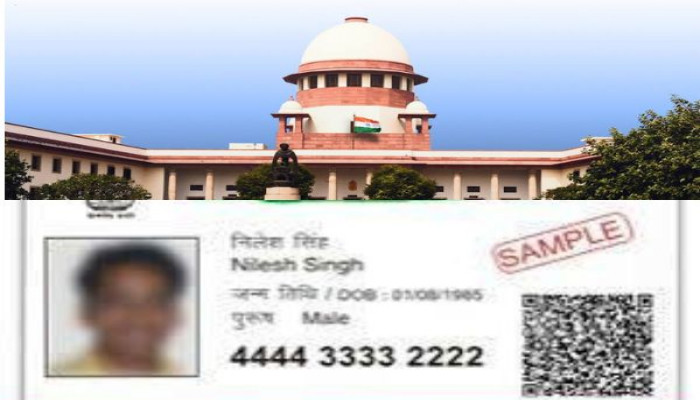Aadhaar 'not conclusive proof': SC backs EC in Bihar electoral poll revision
- In Reports
- 09:27 PM, Aug 12, 2025
- Myind Staff
The Supreme Court on Tuesday began hearing petitions against the Election Commission’s special intensive revision of electoral rolls in election-bound Bihar, with Justice Surya Kant stating that Aadhaar could not be treated as proof of citizenship.
The court observed that including or excluding citizens and non-citizens from electoral rolls was within the responsibility of the Election Commission.
“Are petitioners saying that Aadhaar card is proof of citizenship? They are not saying that it is not a measure… the Aadhaar Act says so,” Justice Surya Kant said, as quoted by Bar and Bench.
He further said, “See, the Election Commission is correct in saying that Aadhaar can't be accepted as conclusive proof of citizenship; it has to be verified. See section 9 of the Aadhaar Act.”
The Supreme Court did not agree with the argument that most people in Bihar did not have the documents sought by the Election Commission during the revision process.
"This is a case of trust deficiency that's all," Justice Kant remarked during the hearing.
The bench said the first matter to decide was whether the Election Commission had the authority to carry out the verification process. Justice Kant said, "If they don't have the power, everything ends. But if they have the power, there can't be a problem."
Senior advocate Kapil Sibal, appearing for Rashtriya Janata Dal MP Manoj Jha, argued that the Election Commission’s process would lead to large-scale voter exclusion, especially affecting people who could not submit the required forms.
He said that even voters whose names were in the 2003 rolls were being told to submit fresh forms, and that not doing so led to their names being deleted despite no change in their address.
The bench of Justices Surya Kant and Joymalya Bagchi said, “If out of 7.9 crore voters, 7.24 crore voters responded, it demolishes the theory of one crore voters missing.”
Calling it “largely a case of trust deficit, nothing else”, the court asked the Election Commission to be prepared with “facts and figures” including the number of voters before the exercise, the number of dead voters earlier and now, and other details.
Kapil Sibal pointed out discrepancies, saying that there were cases where voters marked as dead were actually alive, and living people were listed as dead.
Senior advocate Rakesh Dwivedi, representing the Election Commission, said some “defects here and there” were bound to happen in such a process, but errors could be fixed as it was only a draft roll. He also said that about 6.5 crore people did not need to submit documents as they or their parents were already in the 2003 rolls.
Advocate Vrinda Grover called the revision “an unlawful exercise which lies within the bounds of parliament”.
Activist Yogendra Yadav criticised the revision as “the largest exercise of disenfranchisement in the history of the world” and claimed that “65 lakh names have been deleted. Never in the history of India has this happened.”
He alleged, “When I file an appeal for not including my name, it is decided after the list is frozen — and then, best of luck after five years. This is dreadful. We also have confirmation that more names of women have been deleted than men — 31 lakh women, 25 lakh men.”
Yadav also questioned procedural changes, the 2003 precedent, and the belief that electoral rolls were inflated, calling it “an exercise in intensive deletion” and warning that “vast exclusion has already begun”.
The draft roll was released on August 1, and the final roll was planned for publication on September 30.
Opposition leaders including Manoj Jha, Trinamool Congress MP Mahua Moitra, Congress leader KC Venugopal, NCP MP Supriya Sule, CPI leader D Raja, SP leader Harinder Singh Malik, Shiv Sena MP Arvind Sawant, JMM leader Sarfraz Ahmed, and CPI(ML) leader Dipankar Bhattacharya had challenged the revision, saying it could lead to crores of eligible voters losing their right to vote.
Several civil society groups, including PUCL, ADR, and activists like Yogendra Yadav had also approached the court against the Election Commission’s order.







Comments